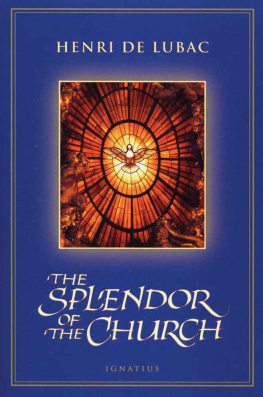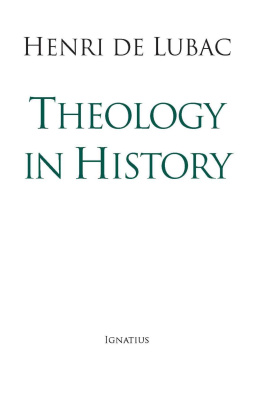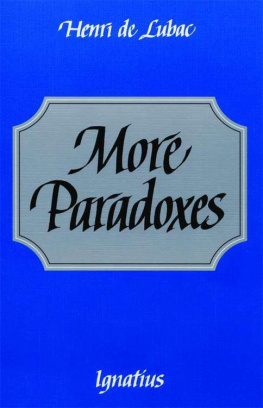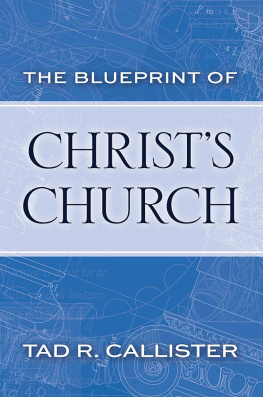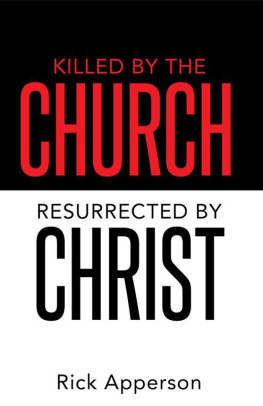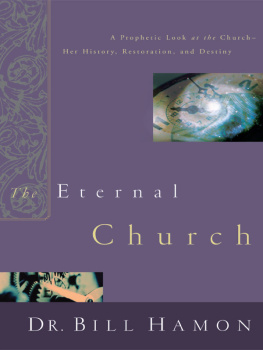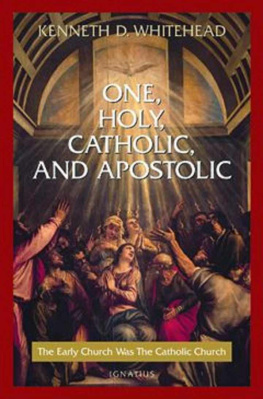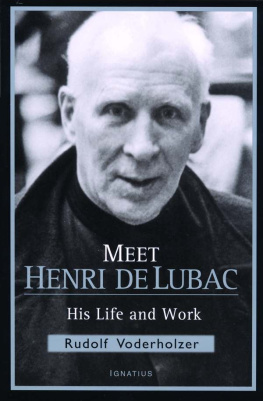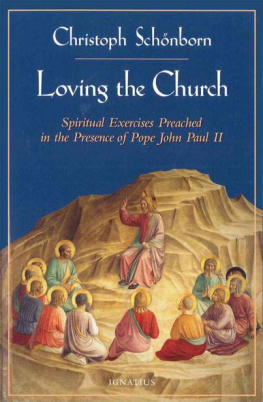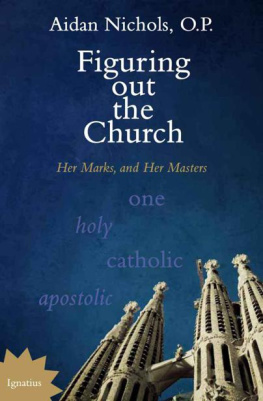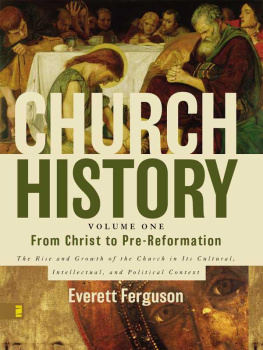THE SPLENDOR
OF THE CHURCH
Henri de Lubac
THE SPLENDOR
OF THE CHURCH
Translated by
MICHAEL MASON
IGNATIUS PRESS SAN FRANCISCO
This translation was originally published by
Sheed and Ward, New York, 1956
and is from the second edition of
the French original:
Meditation sur lglise
1953 ditions Montaigne, Paris
Cover art:
The Holy Spirit
Alabaster window, detail of the Cathedra of Saint Peter
by
Gian Lorenzo Bernini
Photograph by Stefano Spaziani
Calligraphy by Victoria Hoke Lane
Cover design by Roxanne Mei Lum
With ecclesiastical approval
1986, 1999 Ignatius Press, San Francisco
All rights reserved
Reprinted in 2006
ISBN 987-0-89870-742-7
ISBN 0-89870-742-0
Library of Congress catalogue number 99-73012
Printed in the United States of America
This re-edition is
dedicated to Cardinal de Lubac
in the year of his ninetieth birthday.
My personal debt of gratitude to this
extraordinary scholar, loyal churchman,
gracious and patient teacher, and fellow Jesuit
is but a small part of what is owed him
by the countless numbers of men and women of every land
whose faith has been so profoundly enriched
by his lifes work.
Cardinal de Lubac is above all else
a man of the Church, homo ecclesiasticus ,
such as he himself portrays in these pages.
He has received all from the Church.
He has returned all to the Church.
This book, which, characteristically, he so humbly describes
in its introduction, is a testament that will endure
to his lifelong love of his Mother and ours,
the Immaculate Bride of the Lamb,
Holy Church.
Joseph Fessio, S.J.
Editor, Ignatius Press
Contents
INTRODUCTORY
T HE subject matter of this book was, originally, that of various conversations I had with fellow priests at days of recollection, study weekends and retreats, and the like; so that the reader should not expect it to be scientific. Still less should it be treated as a pocket treatise on the Church; I had no intention of doing original research, or doing yet again what has already been done quite satisfactorily by others. What I have done is meditate, in the light of faith, on certain aspects of the mystery of the Church, as an attempt to work myself into the very heart of that mystery. There are, I know, plenty of texts cited at the foot of each pagesometimes rather haphazardly, I am afraidbut that is only with the idea of giving the reader a direct line on the essential texts of Tradition; for my ambition is simply to be its echothat is all. I want to share with others the recurrent thrill that comes from recognizing that impressive and undivided voice in all its modulations and all its harmonics.
That voice of Tradition has continually called on me to look up into the Heavenly Jerusalem, whose beauty has taken a daily firmer hold upon me. But for all that I have not looked to the heavenly city as one does to a dream; for I have not been looking for a sort of refuge from everyday monotony and the burden of existence, in some airy mirage or other. On the contrary; to me, that mother-country of freedom, with all its royal majesty and heavenly splendor, is something to be seen at the very heart of earthly reality, right at the core of all the confusion and all the mischances that are, inevitably, involved in its mission to men. My love is for the Holy City not only as it is ideally, but also as it appears in history, and particularly as it appears to us at present; and I love it with an ever-growing affection. So, since that is where my heart lies, and since heart speaks to heart, my hope is that othersespecially my fellow priestswill find helpful what has been of help to me. It may be that some of the reflections I put before them will seem out of date already; today situations change quickly, as do mental attitudes and key problems, particularly among those who are more hotly engaged than the present writer in the world of action. But I was not really aiming at topical application. We live in a particularly turbulent period, and it is impossible that its troubles should be altogether without repercussions in our souls. And if at such a time anything I have to say can help anyone to a clearer sight of the Bride of the Lamb, in all her radiant motherhood, my object will have been achieved and I shall be well satisfied.
PREFACE TO THE SECOND EDITION
T HIS book had hardly been finished before there had appeared a whole series of further works that demanded to be taken into account in ita demand met, as far as possible, in the second edition, which does not, however, otherwise make any substantial change from the first. In one or two places I have made further precisions, additional citations of traditional texts or documents of the Magisterium, or developments aimed at getting a closer view of this historical process or that linguistic factand that is about all. Though I have been able to take advantage, where various matters of detail have been concerned, of the helpful suggestions of several correspondents, the reviews I have seen so far have (I am glad to say!) been too kind to do much for me in that direction.
One of my reviewersFr. Georges Courtadewrote: This book is closely connected with several previous books by the same author, and he goes on to add that it even makes numerous borrowings from them. Leaving on one side the many things he had to say in praise of the book as well, I am glad to be able to confirm that statement. For my aim was not, in fact, to break new ground; all I was trying to do was to extend a little the effect of my own effortshowever insignificant these may have beenbetween the years 1945 and 1950 in particular, during which time I felt, too strongly for comfort, the gathering of those dangers which have in some cases, unfortunately, since become only too clear to all. It was something that I wanted to do without putting a damper on goodwill in any quarter. I went so far as to hope that even though some of the things I said might be clumsily put, the reader might still be able to see through them, in the last analysis, not the ideas or the arguments of an individual, let alone his prejudices and his limitations, but the authentic voice of our Mother the Church, which can never lack in power and sweetness to persuade where her own children are concerned. Granted, that is an ideal impossible of attainment. Yet I hope nevertheless that I have got near enough to itor at least have given sufficient evidence of my desire to reach itfor the effect of my words to be in no instance contrary to this sole desire of mine.
In 1949 a certain theologian denounced, among the dangers of the time, the spirit of faction that had found its way into certain ecclesiastical circles in France; a taste for daring innovations in matters of doctrine, the use of principles that were implicitly Modernist, adventurings on the slippery slope of esotericism, contempt for the hierarchy, and the like. Whether any clique so minded really did exist or not, I do not know; I sincerely hope not. But it does seem to be undeniable that the sense of the Church was sometimes threatened even in men of the utmost nobility of character and the profoundest loyaltyor that at any rate it ran much risk of being so threatened, existing as it did among so many adverse influences attacking it from all sides. Hence a sense of alarm on my part, which I could not but give expression to in discussions whose publication I could have wished to take place more speedily. Yet I must be quick to add that my expression of concern was at the same time and in a far deeper sense one of joy as well. It could not be otherwise for anyone able to realize, to some extent at least, the pricelessness of that good which consists, quite simply, in belonging to the Church at all. Once you have got your eyes in focus, you cannot miss the wonderful blossoming that goes on everywhere in her garden. And it does not matter where the causes of sorrow or worry throng in from, or how grave they are, or what their nature may be; joy is still triumphant, breaking through the most somber of appearances and flourishing on everything that should, humanly speaking, snuff it out. Joy is over everything and the foundation of everything. So that the Churchs children can boldly borrow the words of the Bridegroom in the Song of Songs (which, St. Bernard says, is the Holy Spirits masterpiece) and say to their Mother, with a depth of feeling born of ever-increasing conviction: Thy voice is sweet and thy face is beautiful.
Next page
